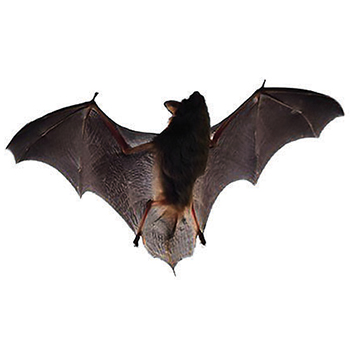Delaware Bat Control

With eight different species of bats known to live in the state of Delaware, it’s important that homeowners and business owners have a plan of action for bat control or a plan to get rid of bats that may have taken up residency. Though most bats present a small risk of biting humans, they still can create significant problems by trafficking disease, fungus, and bacterial growth through several different means. To protect your home or business from bats, you need to learn about the behavior of this pest, take steps for prevention, and find effective treatment options should an infestation occur.
What Is a Bat?
Partly made famous by Halloween movies, bats are nocturnal flying mammals found across the globe including prevalence in the northeastern U.S. While there are 1,400 species worldwide, Delaware is home to 8 known species. Wildlife control experts at Viking Pest explain bats range in size from weighing smaller than a penny to the flying fox breed, which carries an impressive wingspan of over six feet! Bats can live up to 30 years in the wild as they have few natural predators — the biggest being disease. While bats can be a pest to your home or business, they do play a pivotal role in pollination and eradicating other pests for farmers and foresters.
How Do I Identify a Bat?
Spotting a bat may be difficult as they spend the majority of their time feeding and traveling after the sun goes down. While various species will look slightly different, all bats tend to resemble small rodents covered in fur with wings. As the only flying mammal, bats are fairly easy to distinguish from birds and other flying creatures. Bats come in various colors with the majority being brown, black, red, tan, or gray.
Wildlife control experts explain the majority of the time, you will see bats flying through the sky or perched upon a tree or under an awning or easement. There are instances where you may find bats grounded (on the ground), but these are rare and can sometimes be indicators of rabies, so you will want to exercise extra caution in these situations.
When Are Bats Present in Delaware?
In Delaware, there are two main classifications of bats — cave bats and tree bats. Classifications are based on where the bats choose to build their colonies. Cave bats tend to stay in DE year-round, spending winters hibernating in caves. The Delaware wildlife control experts at Viking Pest explain during the warmer summer months, cave bats roost and raise their young outside of the caves. Tree bats, on the other hand, are migratory and have been known to travel great distances in the spring and fall months.
How Do I Control Bats in Delaware?
To get rid of bats in Delaware, you’ll want to enlist the help of a wildlife control professional. While bats are an essential part of the ecosystem, up to 6% of bats carry rabies, and their excrement can create a disease-causing fungus that, when ingested by humans, can have a negative effect on the lungs and vision. Migratory tree bats also tend to return to the same areas every single year. If you are planning on waiting out a bat problem, you’re not going to have much success.
As bats are a protected species in most areas, you’ll need to rely on the help of a wildlife control expert to help you get rid of bats the right way. Wildlife control experts have a host of minimally invasive strategies to safely remove bats from your Delaware home or business.
One of the most popular methods of bat control is exclusion, which involves a mix of bat-proofing your home or business and removing unwanted visitors. According to state government officials, there are specific limitations about what times of the year you’re able to do different forms of exclusion. Bat exclusion can be performed by Viking Pest on April 1st – 30th and August 1st – October 15th.
Bat Exclusion During Maternity Season
Bat exclusion can legally be performed April 1 – 30 and August 1 – October 15 as stated by the NJ Division of Fish and Wildlife. These guidelines protect bats and people by ensuring exclusion is done effectively, working with the bats’ natural rhythms. Performing exclusion work outside of these windows is more likely to result in bats getting into your living space and/or cause illegal harm to the animals. If bats are invading your home outside of the legal exclusion window, please read below.
- Our wildlife control experts can block openings between the bats’ roost and human living areas (i.e. the space beneath the attic door, holes in ceilings or walls, etc.) at any time of year since doing so will not disturb or trap bats. This is a preventative measure to keep bats from coming into contact with people or pets inside the home.
- For health-related concerns, residents should contact their local health department.
- You can find more info on the NJ Division of Fish and Wildlife Bat Conservation webpage and Bats in Buildings page.
As always, free bat houses are available to customers who’d like to give their bat colony a new place to roost – contact Viking Pest today if you would like to reserve a FREE bat house for your home.
Can Bats Spread COVID-19?
People cannot contract COVID-19/SARS-CoV-2 virus from bats.
Viking Pest Can Control Bats in Delaware
Viking Pest offers expert treatment designed to effectively and efficiently control and prevent bats from invading your home or business in Delaware. Our use of Integrated Pest Management (IPM) techniques focuses on finding the core of the pest concern and controlling bats from the source. Through IPM, pest control materials are selected and applied in a manner that minimizes risks to human health, pets, and the environment.
Call Viking today for your FREE and NO OBLIGATION estimate at 1-800-618-2847 or schedule online today!














